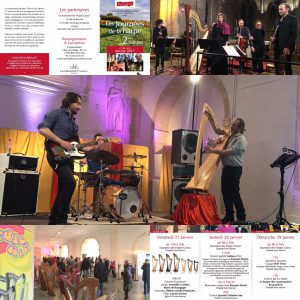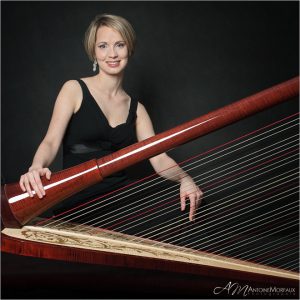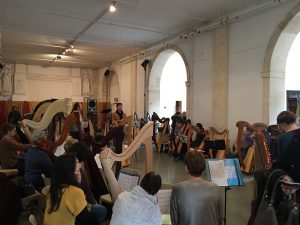Camac Blog
2nd Journées de la harpe, Beaune
News
February 24, 2017
Now in their second year, the Journées de la harpe in Beaune is a collaboration between harpist Dorothée Cornec, the Conservatoire de Musique et de Danse Beaune Côte & Sud, and us. Like many of our long weekends, the event combines concerts and workshops across the harp’s musical spectrum, and brings student harpists together with local professionals and international guests. This year, we were delighted to enjoy an opening concert of French classical repertoire in the Eglise St Nicolas Beaune, with Delphine Latil, the Marie-de-Bourgogne string quartet, Hélène Leriche-Partouche (clarinet) and Laurent Parisot (flute).
On Saturday, the focus moved to the lever harp, and some of its most exciting contemporary developments. François Pernel and his Trio Galexya gave a fantastic coffee concert at 11h30, followed by an extensive (and jam-packed!) workshop after lunch. In the evening, the municipal theatre hosted the wonderful Christine Lutz Quartet, and it was gratifying to see the interest among the general public for our instrument, as well as from harpists. On Sunday, the two sides came together wonderfully! A concert from local group Fest Tilla was followed by an enormous harp ensemble from all the harp classes of the region, and attracted many curious Sunday visitors, as well as parents and friends.
 We also particularly like going to Beaune because of the palpable support from the conservatoire for their harp department – and for the other harp classes of the region, who are warmly invited to join in. You do not always see a conservatoire director so present at harp events, but we are welcomed magnificently by Pascal Tressos in Beaune. This institutional interest in the harp is essential for the development of our instrument, and it is not a coincidence that most successful harp departments are run by charismatic and persuasive teachers who are constantly
We also particularly like going to Beaune because of the palpable support from the conservatoire for their harp department – and for the other harp classes of the region, who are warmly invited to join in. You do not always see a conservatoire director so present at harp events, but we are welcomed magnificently by Pascal Tressos in Beaune. This institutional interest in the harp is essential for the development of our instrument, and it is not a coincidence that most successful harp departments are run by charismatic and persuasive teachers who are constantly badgering inspiring their directors. It is something which is particularly important at music school level, because the music schools greatly influence the level at the senior conservatoires. Sit on an audition panel for a conservatoire that is not well-served by a good base of music schools, and what will happen is as follows. On the one hand, you will hear candidates whose foundation is so weak, that you seriously have to question their realistic chances of a musical career in five years’ time. On the other, the professor has to fill his class, or be out of a job. This depressing dilemma does not happen where there are enough good music schools, supporting their students and each other.
We left Beaune buoyed up by the commitment of Mr Tressos, Dorothée Cornec and their colleagues, by the large and energetic harp classes, and by the warm and interested general public. Here’s to the third edition! We hope to see you there.


